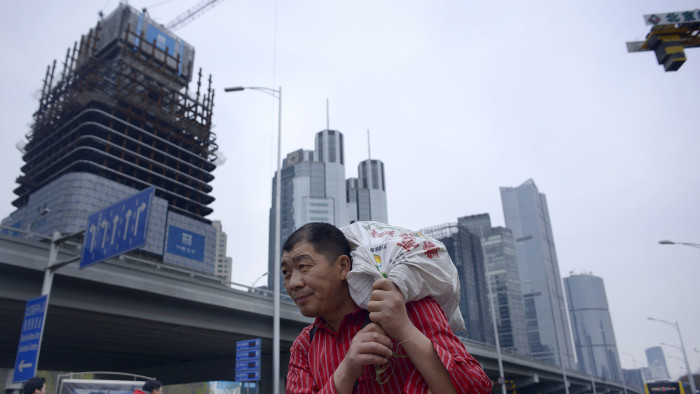China cannot believe its luck over new investment bank

Roula Khalaf, Editor of the FT, selects her favourite stories in this weekly newsletter.
The Chinese government can scarcely believe its own luck. Heaping Asian insult upon Capitol Hill injury, last week Benjamin Netanyahu committed Israel to join Beijing’s new Asian Infrastructure Investment Bank.
While there is no love lost between the Israeli prime minister and US President Barack Obama, who was embarrassed by Mr Netanyahu’s congressional address on March 3, Beijing could not have expected to attract such a longstanding American ally to the AIIB when it first conceived of the institution at least two years ago.
What began as a seemingly quixotic defection to the AIIB by the UK — the first US partner to turn a deaf ear to American protestations about the bank — has turned into an unalloyed strategic triumph for Beijing.
More than 50 countries, including traditional US military allies such as Australia and South Korea, have signed up. Only Japan has — so far — stood by Washington’s side, echoing the Obama administration’s concerns about governance and transparency standards at the new bank.
The Chinese government’s success with the AIIB is not just luck, however, it is the fruit of a very smart policy adjustment.
From its declaration of an air defence identification zone over the East China Sea in November 2013 to its deployment of an oil rig near Vietnam last May, Beijing’s assertion of “hard power” appeared to be putting it on a collision course with almost all of its regional neighbours.
The nadir came on May 26, when a small Vietnamese fishing vessel harassing the oil rig was run down and sunk by a much larger Chinese trawler. The incident, which arguably amounted to attempted homicide on the high seas, has since been immortalised on YouTube.
In private, Chinese foreign policy experts acknowledge that the violent protests that erupted across Vietnam after the over-reach in the South China Sea provided a powerful wake-up call. With the annual Asia Pacific Economic Co-operation summit scheduled to be held in Beijing just six months later, the Chinese government decided to ditch hard-power projection for soft-power persuasion.
At APEC, the Chinese government backed down from a looming confrontation with Japan over the contested Senkaku or Diaoyu islands; signed unexpected environmental and military accords with the US; and unveiled a $40bn fund to support an infrastructure-focused “New Silk Road” linking Asia to Europe. The AIIB will contribute at least another $100bn to this initiative in which Beijing intends to assume the role once held by Venetian bankers along the old Silk Road.
China’s strategic volte face has benefited from an almost comic series of mis-steps by its great geopolitical rival. US congressional reluctance to sign off on reforms giving China and other developing nations a greater role at the World Bank and International Monetary Fund has been compounded by the Obama administration’s inability to, as they like to say on Capitol Hill, “count the votes” on the AIIB.
It is one thing to oppose an institution behind-the-scenes and fail quietly; it is quite another to do so brazenly. Worse for Mr Obama, his standing in the Asia-Pacific region will deteriorate even further if he cannot secure congressional “fast-track” authority to seal the deal on the Trans-Pacific Partnership trade talks, which pointedly exclude China.
Should TPP fail, then the economic component of the US president’s “pivot” towards Asia will — to Beijing’s surprise and delight — have completely unravelled.
Chinese President Xi Jinping cannot, however, celebrate just yet. While 2015 may have started out as an annus mirabilis for Beijing, an evolving diplomatic mess in Sri Lanka is a reminder of how quickly geostrategic momentum can change.
China’s crisis in Colombo is largely of its own making, having bankrolled some $5bn-worth of infrastructure projects on the assumption that Mr Xi’s erstwhile ally there, Mahinda Rajapaksa, had as firm a grip on power as the Chinese Communist party does.
Mr Rajapaksa’s shock election defeat in January has exposed China’s Sri Lankan infrastructure investments — and related lending packages — to unwelcome scrutiny from the new government in Colombo. If proven, the accusations there of a lack of transparency and worse will perfectly illustrate Washington and Tokyo’s worst fears about potential governance lapses at the AIIB.
Beijing’s challenge now is to ensure that the mistakes in Sri Lanka are not repeated under the auspices of its popular new bank.
Comments